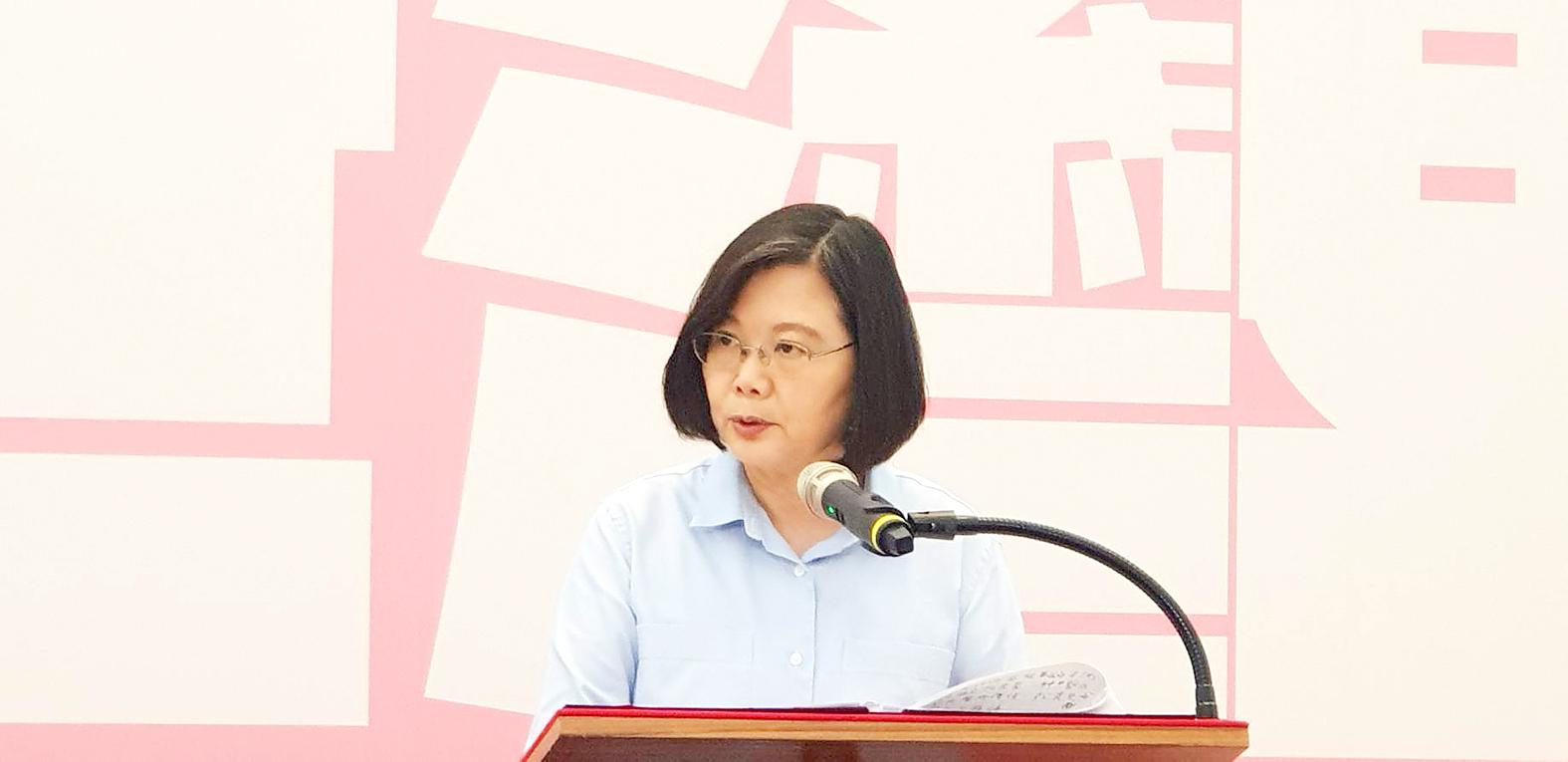The government yesterday said that it had expressed its concern to Tokyo after a Taiwanese fishing vessel was reportedly harassed by two Japanese ships near the Diaoyutai Islands (釣魚台), adding that it would defend regional stability amid the “increasingly intricate” situation.
The Sheng Fu No. 16, which is based in Yilan County’s Suao Township (蘇澳), on Tuesday reported that two Japan Coast Guard ships took photographs and asked it to stop its activities when it was about 63 nautical miles (117km) northeast of Yilan.
The Coast Guard Administration dispatched a 500-tonne vessel to patrol the area, but did not encounter any Japan Coast Guard ships, it said.

Photo: Lee Hsin-fang,Taipei Times
The Fisheries Agency later yesterday said that the Japanese Ministry of Agriculture, Forestry and Fisheries confirmed that it had sent a ship to “warn” the Taiwanese vessel using an electronic bulletin board as “preventive action.”
President Tsai Ing-wen (蔡英文) yesterday reaffirmed the nation’s sovereignty over the islands and said the government would work to maintain regional stability.
She called on neighboring nations to remain calm and cease any unilateral action that might provoke regional instability.
The Executive Yuan has ordered the coast guard to do its utmost to ensure fishers’ rights and safety, and over the past four years Taiwanese fishers had not been obstructed when operating in the waters near the islands, she said.
“Fisheries rights are also a form of sovereignty rights,” Tsai said.
The regional situation has become increasingly intricate amid many ongoing military and political incidents, Tsai said, adding that despite the COVID-19 pandemic, her administration would continue to defend the nation’s interests and security.
The coast guard later yesterday said that the Japanese Ministry of Agriculture, Forestry and Fisheries confirmed that it had sent a ship to “warn” the Taiwanese vessel using an electronic bulletin board as “preventive action.”
The Taiwanese ship’s vessel monitoring system showed that it had operated near, but did not exceed, the agreed border north of the Yaeyama Islands, Fisheries Agency Deputy Director-General Lin Kuo-ping (林國平) said.
Taiwan and Japan in 2013 signed a fisheries agreement that demarcated an agreed-upon area where fishers from both nations could operate. The area does not include the 12 nautical miles around the Diaoyutai Islands, which are claimed by Taiwan, Japan and China.
The Ministry of Foreign Affairs has instructed the Taipei Economic and Cultural Representative Office in Japan to express the government’s concern about the case to Tokyo, ministry spokeswoman Joanne Ou (歐江安) said in a statement yesterday.
After Chinese vessels repeatedly entered waters near the Diaoyutai Islands, Ishigaki City Council of Japan’s Okinawa Prefecture proposed changing the islands’ administrative name from “Tonoshiro” to “Tonoshiro Senkaku.”
The proposal was passed by the council on Monday.
Yilan County Council on June 11 passed a provisional motion recommending that the islands be renamed Toucheng Township Diaoyutai (頭城釣魚台). The council on Tuesday established an office charged with protecting the islands and invited fishers to visit the islands on July 7.
Additional reporting by CNA and Lin Ching-lun

Right-wing political scientist Laura Fernandez on Sunday won Costa Rica’s presidential election by a landslide, after promising to crack down on rising violence linked to the cocaine trade. Fernandez’s nearest rival, economist Alvaro Ramos, conceded defeat as results showed the ruling party far exceeding the threshold of 40 percent needed to avoid a runoff. With 94 percent of polling stations counted, the political heir of outgoing Costa Rican President Rodrigo Chaves had captured 48.3 percent of the vote compared with Ramos’ 33.4 percent, the Supreme Electoral Tribunal said. As soon as the first results were announced, members of Fernandez’s Sovereign People’s Party

MORE RESPONSIBILITY: Draftees would be expected to fight alongside professional soldiers, likely requiring the transformation of some training brigades into combat units The armed forces are to start incorporating new conscripts into combined arms brigades this year to enhance combat readiness, the Executive Yuan’s latest policy report said. The new policy would affect Taiwanese men entering the military for their compulsory service, which was extended to one year under reforms by then-president Tsai Ing-wen (蔡英文) in 2022. The conscripts would be trained to operate machine guns, uncrewed aerial vehicles, anti-tank guided missile launchers and Stinger air defense systems, the report said, adding that the basic training would be lengthened to eight weeks. After basic training, conscripts would be sorted into infantry battalions that would take

GROWING AMBITIONS: The scale and tempo of the operations show that the Strait has become the core theater for China to expand its security interests, the report said Chinese military aircraft incursions around Taiwan have surged nearly 15-fold over the past five years, according to a report released yesterday by the Democratic Progressive Party’s (DPP) Department of China Affairs. Sorties in the Taiwan Strait were previously irregular, totaling 380 in 2020, but have since evolved into routine operations, the report showed. “This demonstrates that the Taiwan Strait has become both the starting point and testing ground for Beijing’s expansionist ambitions,” it said. Driven by military expansionism, China is systematically pursuing actions aimed at altering the regional “status quo,” the department said, adding that Taiwan represents the most critical link in China’s

‘REALLY PROUD’: Nvidia would not be possible without Taiwan, Huang said, adding that TSMC would be increasing its capacity by 100 percent Nvidia Corp CEO Jensen Huang (黃仁勳) on Saturday praised and lightly cajoled his major Taiwanese suppliers to produce more to help power strong demand for artificial intelligence (AI), capping a visit to the country of his birth, where he has been mobbed by adoring fans at every step. Speaking at an impromptu press conference in the rain outside a Taipei restaurant, where he had hosted suppliers for a “trillion-dollar dinner,” named after the market capitalization of those firms attending, Huang said this would be another good year for business. “TSMC needs to work very hard this year because I need a lot